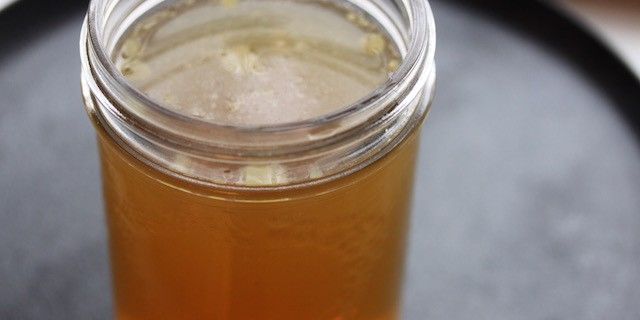Place carcass, veggies and herbs in a slow cooker or pot. Cover with 6 L cold water water. Add
vinegar. Cook in a slow cooker on low heat for a minimum of 12 hours, and up to 24 hours. OR cook on the stovetop by bringing to a boil, and reducing heat to minimum for at least 12 hours. As foam floats to the top (in the first hour) scrape off and continue simmering.
Note: a good gel (formed from gelatin) is ideal but usually happens from the stove-top method more often.
Strain and squeeze liquid out of the veggies and carcass. Place in jars about 3/4 full, and place in the fridge for a few hours or overnight. Fat will rise to the top. Skim off the fat. Then label jars with name and date, and place in freezer OR transfer to freezer bags so they can be frozen and stored lying flat.
If liquid is the consistency of gel or jelly that’s a good thing. Don’t be freaked out.
Tips: Use chicken broth to replace water when cooking soups, stews, whole grains (like rice or quinoa) or consume as a nourishing drink to soothe and heal the gut.
Vegetable add-in ideas: Whole veggies chopped, or vegetable scraps (celery and celery leaves, onion, carrots, fennel and fennel tops, wild mushrooms, garlic, apples, leeks, parsley stems — other veggies will taste too strong and affect flavour)


Why is this considered not healthy ? Bone broth should be very good for you
Hi Alina, great question! If you click on the Health Rating meter you'll see that it says what's "Not so healthy" is that the chicken carcass contributes 30% of calories from saturated fat per serving.
Our Health meter's algorithm is based on nutrition research. That includes the recommendation that it's best to keep saturated fat to a minimum because studies show that some types have been associated with heart disease (i.e. an increase in LDL cholesterol or the "bad" cholesterol). Our Health meter calculates the composition of foods so that you can make an informed decision about how much or how often to eat it.
You may be aware of some emerging evidence that suggests the link between saturated fat and cardiovascular disease is not as simple as once thought. Research to establish a clearer picture is underway. In the meantime, although research still doesn't support large amounts of saturated fat in the diet, it does suggest that perhaps focusing on keeping saturated fat to a strict minimum (under 10% of calories) isn't as important anymore.
Hope this answers your question! :-)